Contents
Guide
Pagebreaks of the print version
EROTIC POEMS FROM THE SANSKRIT Translations from the Asian Classics TRANSLATIONS FROM THE ASIAN CLASSICS Editorial Board Wm. Theodore de Bary, Chair Paul Anderer Donald Keene George A. Saliba Haruo Shirane Burton Watson Wei Shang Erotic Poems from the Sanskrit

An Anthology Edited and translated by R. PARTHASARATHY Columbia University Press|New York Columbia University Press wishes to express its appreciation for assistance given by the Pushkin Fund in the publication of this book.

Columbia University Press Publishers Since 1893 New YorkChichester, West Sussex cup.columbia.edu Copyright 2017 Columbia University Press All rights reserved E-ISBN 978-0-231-54546-4 Library of Congress Cataloging-in-Publication Data Names: Parthasarathy, R., 1934- editor, translator. Title: Erotic poems from the Sanskrit : an anthology / [edited and translated by] R.
Parthasarathy. Description: New York : Columbia University Press, 2017. | Series: Translations from the Asian classics | Includes bibliographical references nd index. Identifiers: LCCN 2016059358 (print) | LCCN 2017019170 (ebook) | ISBN 9780231184380 (cloth : acid-free paper) | ISBN 9780231184397 (pbk. : acid-free paper) Subjects: LCSH: Erotic poetry, SanskritTranslations into English. | Sanskrit poetryTranslations into English.
Classification: LCC PK4474.A3 (ebook) | LCC PK4474.A3 E76 2017 (print) | DDC 891/.2100803538dc23 LC record available at https://lccn.loc.gov/2016059358 A Columbia University Press E-book. CUP would be pleased to hear about your reading experience with this e-book at . Cover design: Jordan Wannemacher Cover illustration: Rdh , Rajasthani, Kishangarh, ca. 17401748; courtesy of the National Museum, New Delhi; photo alamy.com For Mohan Arjun Gautam and Masako CONTENTS I thank Terence Diggory, Barry Goldensohn, Robert Goodwin, and Christopher McVey for their comments on early drafts of the manuscript. I am indebted to David Shulman for his insightful remarks on eight of the poems. I have benefited from the suggestions of the two anonymous reviewers, which helped to improve the manuscript immeasurably.
My thanks are due to Amy Syrell and Marilyn Sheffer of the Interlibrary Loan Service of the Lucy Scribner Library at Skidmore College for getting me the Sanskrit books I needed. My greatest debt is to my wife, Shobhan, who read and reread the manuscript carefully several times. If the poems speak to us, it is in large measure because of her keen ear and good sense. Jennifer Crewe, associate provost and director, Columbia University Press, was from the beginning enthusiastic about the work. Her encouragement and patience were exemplary during my final revisions of the manuscript. My editor, Jonathan Fiedler, and Leslie Kriesel, assistant managing editor, were unfailing in their support.
To Mike Ashby, my copyeditor, I am indebted for his meticulous editing of the manuscript. He saw to every detail, and nothing seemed to escape his watchful eye. Grateful acknowledgment is made to the editors of the following magazines in which some of these poems first appeared, either in earlier or current versions: Indian Literature : The Bed, The Lamp, The Pledge, Wild Nights Manushi : Bitter Harvest, The Riverbank Modern Poetry in Translation : Aubade, The Red Seal, The Traveler, A Word of Advice Poetry (Chicago): The Sheets Verse : Jewels, Then and Now, Who Needs the Gods? Weber Studies : The Art of Poetry, Complaint T his selection of poems is personal; it does not attempt to be representative of Sanskrit poetry in general. It comprises poems that I have enjoyed reading and that have excited me. I have also selected them because I found these poems manageable within the resources of modern English verse. The selection is intended for the general reader and lovers of poetry who might want to know what Sanskrit poetry is like.
It offers a salutary corrective to the notion, still prevalent in the West, that Indians in the past were predominantly otherworldly and spiritually minded. Nothing could be further from the truth. These poems reflect a culture that celebrates the pleasures of the flesh without any inhibition in a language that never gives offense, that never crosses the line but always observes the canons of good taste. In this the Sanskrit poets are our contemporaries despite the centuries that separate us. The poems speak simply and passionately to a wide range of human experiencelove fulfilled and love unfulfilled, old age, poverty, asceticism, and naturein a voice that moves us even today. The introduction makes no pretense to scholarship; it attempts to provide some basic information to the reader who comes to Sanskrit poetry for the first time and who needs guidance on how to read a Sanskrit poem in translation.
The notes at the back of the book throw light on specific elements of the poems such as language, imagery, and tone as well as on culture-specific references. My goal is a modest one: to awaken the interest of the reader in the poem by providing him or her with such tools as are necessary for the enterprise. Wherever possible, the poems are read in a comparative context, with examples from Greek, Latin, English, Chinese, Tamil, and Prkrit poetry. Erotic Poems from the Sanskrit comprises poems by seventy-two poets, including seven women poets and thirty-five anonymous poets, from sixteen works composed, with two exceptions, between the fourth and seventeenth centuries. The poets are presented alphabetically for the convenience of the reader. For a long time, three anthologies of Sanskrit poetry in English translation have held the field: Ingalls (1965), Erotic Poems from the Sanskrit builds upon the work of these distinguished translators.
It offers a new verse translation that introduces the richness and variety of Sanskrit poetry to a new generation of readers in a robust, contemporary English idiom that captures, insofar as possible, the tone and register of the Sanskrit originals. The translations are, above all, English poems that can be read with pleasure by readers of poetry. Love in all its aspects is a favorite theme of the Sanskrit poets. Poems on the topic of erotic love ( kma ) form the centerpiece of the anthologies, and the translations reflect this preference. The poems are often sexually explicit but they never offend our taste. In their openness to the sexual experience, they have a contemporary flavor to them.
Readers who wish to have a greater understanding of Sanskrit erotic poetry might want to familiarize themselves with the conventions of the erotic mood spelled out in such texts as Vtsyyanas Kmastra (The book of love, 4th cent.) or Kalyamallas Anagaraga (The stage of the Bodiless One, 16th cent.). Sanskrit erotic poetry has few equals, with the possible exception of the erotic poems in the so-called Greek Anthology, compiled by the Byzantine scholar Constantinus Cephalas in the tenth century in Constantinople. Translation from one language into another involves some loss, as the Buddhist monk and prolific translator Kumrajva (344413) famously reminded us: In the process of translating a Sanskrit text into Chinese it loses all its nuances. Its something like chewing cooked rice and then feeding it to another person. Not only has it lost its flavor; it will also make him want to throw up. Despite the eminent monks opinion, it is possible to carry across the flavor of a poem from one language to another.


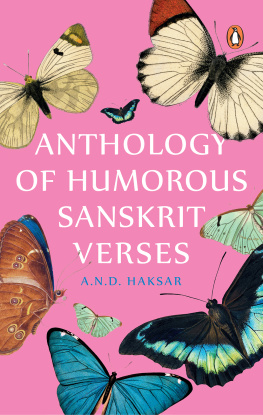
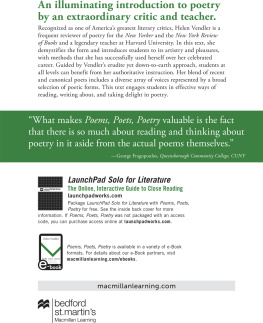

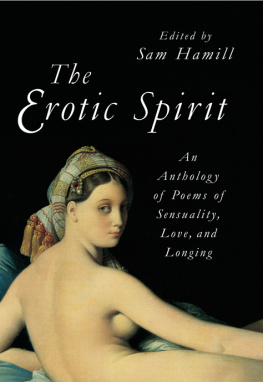
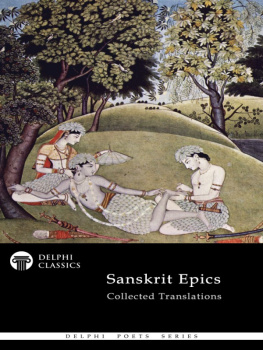
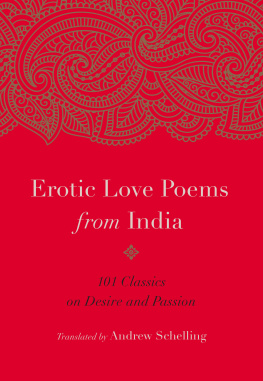
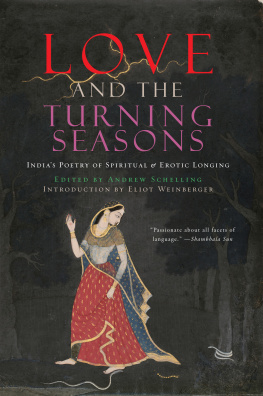
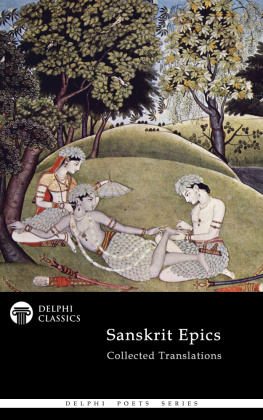
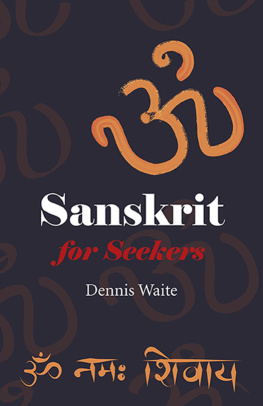
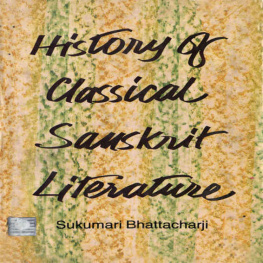
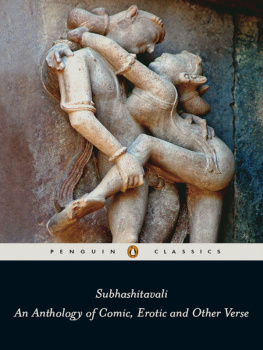
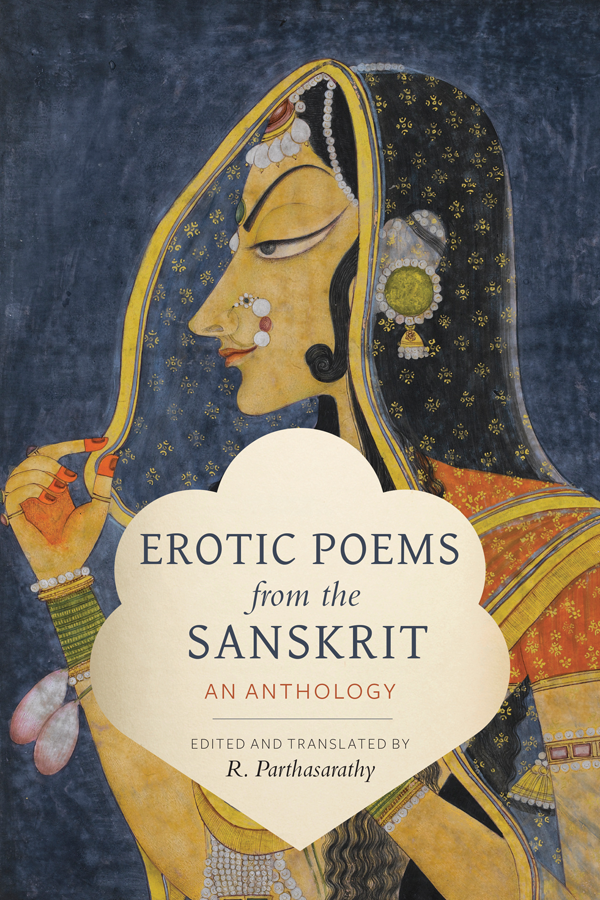
 An Anthology Edited and translated by R. PARTHASARATHY Columbia University Press|New York Columbia University Press wishes to express its appreciation for assistance given by the Pushkin Fund in the publication of this book.
An Anthology Edited and translated by R. PARTHASARATHY Columbia University Press|New York Columbia University Press wishes to express its appreciation for assistance given by the Pushkin Fund in the publication of this book.  Columbia University Press Publishers Since 1893 New YorkChichester, West Sussex cup.columbia.edu Copyright 2017 Columbia University Press All rights reserved E-ISBN 978-0-231-54546-4 Library of Congress Cataloging-in-Publication Data Names: Parthasarathy, R., 1934- editor, translator. Title: Erotic poems from the Sanskrit : an anthology / [edited and translated by] R.
Columbia University Press Publishers Since 1893 New YorkChichester, West Sussex cup.columbia.edu Copyright 2017 Columbia University Press All rights reserved E-ISBN 978-0-231-54546-4 Library of Congress Cataloging-in-Publication Data Names: Parthasarathy, R., 1934- editor, translator. Title: Erotic poems from the Sanskrit : an anthology / [edited and translated by] R.